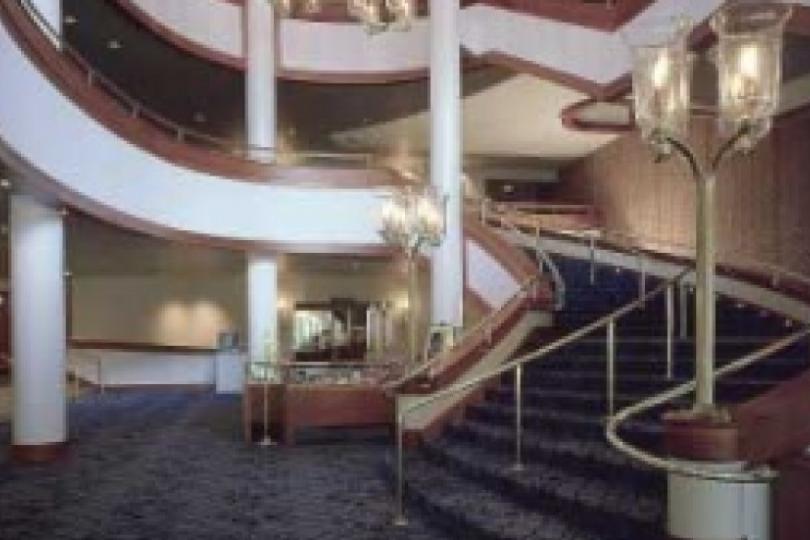In this one part series on theater production I’m going to look at the lobby experience and what it means for an audience member. The result will be a 6-step guide to making sure your lobby experience doesn’t ruin your play. Hopefully it’s helpful but if not please use the comments section to offer opinions and call me an idiot.
Producing a play is a lot of work. Operating a theater space is a lot of work. Sadly, a well run theater space and a well produced play usually result in an audience not realizing how much work was put in to all the things happening everywhere but onstage.
When an audience member attends a live theatrical production they usually decide how good the experience of going to the show was by how they responded to what happened onstage. A positive experience results in praise and good feelings towards the actors onstage, maybe a little praise for the director. A small segment of audience recognizes the work of costume/set/sound/lighting designers and only a minuscule segment of audiences acknowledge the producers involved in the performance. The audience is attributing a plays failure or success to what they can see and hear and feel and smell. The further away your work gets from the audiences five senses the less likely you are to get recognition from them for that work. This is a normal human reaction so don’t be mad at them for it.
But that production work is as important as the creative work that ends up onstage just in very different ways. The marketing of a show, the budget created for a show, the space created wherein the creative work happens heavily influence what ends up on stage. And an audience members experience from the time they purchase their ticket to the time the lights come up on the first scene can make or break a performance.
Where the hell am I?
When you walk into the lobby of the Ordway Center for the Performing Arts in St Paul everything just feels right. There’s a gentleman in elaborate dress opening the door for patrons, the main lobby is spacious yet not sprawling and you can see immediately upon entry where to go for tickets or information. Additionally, the carpeting, lighting, and usually soft piano music all create a comfortable atmosphere that lets you know you’re somewhere other than the rest of your regular life, somewhere where something wonderful may happen.
The Ordway website has a page labeled ‘coming to the Theater’ that takes great pains to lay out simple answers to just about any question a patron may have about parking, accessibility, attire, food and a whole lot more. If you call the theater you get the same clear and concise service from an informed staff.
Obviously, the Ordway has a budget that allows them to devote time and staff resources to these customer service elements of the theater going experience and a great many small theaters and theater companies can’t possibly devote staff purely to these details. But theaters like the Ordway can serve as a model for what theater producers should be trying to do in creating the right atmosphere in which to present their works.
Nobody likes to feel stupid. In fact, it’s one of the worst feelings in the world. Theater goers, in particular, pride themselves on their intelligence and ability to ‘get’ stuff that a non-theater goer wouldn’t. Even if confusion is part of your aesthetic that last thing you want is for members of your audience to walk into the theater after any struggle or confusion with parking, finding the theater lobby or getting their tickets. So you need to be sure this information is readily available online, on the phone, and hopefully on and around the theater itself.
Where the hell are you?
When a theater-goer enters a theater lobby they should immediately see someone who can answer any and every question they may have. Or at least a clear indication of where to go to find that question-answering person.
If you’re producing a play in a space that isn’t your own make sure you know how your theater-goer will get from the front door to the person who can give them tickets and answer questions. Be certain this path is as clear and intuitive as possible for someone who has never walked into that space before. You’re herding sheep who are capable of having an existential crisis and you’ve got no sheep dog.
Don’t misunderstand, no one is at the theater to see or talk with the question answering people. In fact, the vast majority of audience members would rather not have to ask questions or mention problems. They want to get their tickets and get on with the joyous moments before the curtains rise and the stage lights come up when your Schroedinger’s Cat of a play is still both perfect and dreadful.
Was I supposed to bring my own coat hanger?
Now that your theater-goer has made it through the gauntlet of parking and navigating the lobby they’ve arrived at the first opportunity to connect with a representative of the production they’ve come to experience. This first point of contact person may be theater staff, a volunteer, or an actor from the show who drew the short straw that night. Your theater-goer doesn’t care who the person is they just need eye contact, a smile, and an enthusiastic readiness for any question or issue no matter how boring, repetitive, or strange it may be.
Whomever takes on the job of being first point of audience contact needs to have the answers to every question or know how to get the answers. Or, if it’s an unanswerable question they should know how to not answer the question while making the theater-goer feel as though the question has been resolved. Maybe the same question will be asked 20 times. To each theater-goer it is a completely unique question or issue. Maybe the same theater-goer has asked the same question 20 times. What a wonderful exercise in patience. Thank them for this exercise by answering the question sincerely each and every time.
This certainly isn’t the greatest job in the world. But doing it poorly can ruin a theater experience for an audience member, which can negatively impact the experience for their fellow audience members, which will then negatively impact the experience for the actors and technicians. And a negative experience for the actors and techs will absolutely result in a torrent of emotions and complaints.
Success as first point of contact at a theater is really a big step towards world peace.
Do you feel a draft?
So what if it’s a little too warm or a little too cold in the lobby. Your theater-goers will soon be making their way into the theater space where the temperature is perfectly calibrated and the performances are of such a quality no one will care about their personal comfort, right?
Assuming everything is just right inside the performance space, and kudos to you if that’s ever the case, comfort in the lobby can still have an enormous impact on the audience’s experience.
The lighting should be dim enough that no one is reminded of the hours they’ve recently spent at their cubicles but bright enough that no one is accidentally talking to a ficus tree. The temperature in the lobby should be on the cool side when empty so that as more theater-goers show up and breathe and sweat and be generally warm-blooded it becomes comfortably room temperature.
Some lobbies will have music playing prior to a show and some won’t. If yours is a high energy sketch comedy show then fast paced music in the lobby might make sense. If yours is a gripping drama maybe something playful but mellow to help relax your audience before you grab hold of their emotions. Whatever sound is happening in your lobby before the show what’s important is that it fits both the production and the lobby space itself. If silence is what works best for your production then use it just be sure it’s a choice and not the result of no one making a decision.
I thought they’d getter a bigger audience.
Is your lobby space big enough for the number of theater-goers you expect? Is it possibly too big? Perhaps you’re producing a show in a venue with a potential capacity much larger than what you target for your show. If you’re putting on a show aimed at drawing 200 people a night with a lobby that can accommodate 1,000 it may be worth your while to move a few things around to make the lobby more intimate.
Of course you need enough space in your lobby to accommodate as many tickets as you can sell to an individual show. Your audience won’t be in the lobby terribly long but in that time most of them will not want their asses mashed up against strangers. To you ass mashing fans please note that I said most and am not judging those who do enjoy stranger ass mashing just stating that these are in the minority of theater-goers.
But too great a lobby space can make your theater-goer wonder if the turn out for the show is low. From this thought it is a short journey to wondering about the quality of the production and thus whether or not they’ve made the right choice in coming to your show. An audience member unsure about their choice to come to your show is much more difficult to pull in to the world you’ve created on stage. Save your actors some work and throw a few tables down in the lobby if it’s too big, or borrow a taxidermied and mounted polar bear from a wealthy eccentric if you know one.
Did I forget to respond to that email?
Does any of this lobby stuff really matter? Shouldn’t theater producers put all of their energy into getting the best people and the best content and putting on the finest show possible? Yes, absolutely they should.
And every audience member should be able put all of their energy into that show as well.
The only way to make it possible for every member of your audience to give themselves over to you for the hour or two or, are you kidding me, three of your production is by removing as many obstacles and distractions as you can.
Audience members bring a lot with them into a live performance. They carry with them their successes and failures on that day, ongoing stresses in their lives, and every previous theatrical experience. There is no way to remove these elements from an audience member so that they can fully open themselves to the performance. But theater producers can make an effort to not add to all that a theater-goer carries into a performance in order to create an atmosphere for live theater to do what it does best. Which is transport audience members and make them forget, for a short time, all they carry throughout their day.
And when all else fails wear a top hat.
Levi Weinhagen
Levi Weinhagen is a comedy writer and theater maker. He is co-founder of the all-ages theater company
Comedy Suitcase.
Levi is producer and host of
Pratfalls of Parenting, a podcast featuring conversations with artists about the relationship between being an artist and being a parent.





